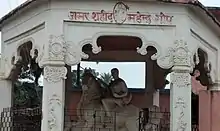Mahendra Gop
Mahendra Gop (15 August 1912 – 23 November 1945) was Indian freedom struggle activist.[1][2] He belonged to a Zamindar family of Rampur, currently a part of Banka district, Bihar. At the age of 33, he was hanged in Bhagalpur Camp Jail in Bihar.[3]
Mahendra Gope | |
|---|---|
| Born | 15 August 1912 Banka, Bihar and Orissa Province, British India |
| Died | 23 November 1945 (aged 33) |
| Cause of death | Execution by hanging |
| Nationality | British India |
| Movement | Indian Independence Movement |
| Criminal penalty | Capital Punishment |
| Criminal status | Executed |
Early life
Mahendra Gop was born on 15 August 1912 in zamindar Yadav family to Ram Sahay Khirhari, in Rampur village of the Banka district, in the state of Bihar.[4][5]
Revolutionary activities
In Bhagalpur, Parshuram Singh organised a group known as Parshuram Dal, this group chalked out a programme of taking revenge from sympathisers of British Government. The real strength of Parshuram Dal lay in Mahendra Gop, who emerged as great leader of this group.[6][7]
During the Quit India movement Mahendra Gope and Parshuram Singh were important revolutionary leaders from south Bhagalpur, who gave open challenge to the government and killed a member of officers.[8][9]
Gop gained a reputation as a ruthless operator and formed his own group within the wider Parshuram Dal movement. Later, Gop became independent and became leader of Gop Dal, particularly after the arrest of Parshuram Singh in May 1943.[10][11]
Mahendra Gope and his group had links with Congress Socialist Party.[12] In May 1943, his group also joined Siaram Singh's party but they were removed from the party for certain reason in June 1943.[13][14]
Death
During September 1944, Gop was arrested with ten others in the Banka jungles He listed 20 people whom he suspected of informing against him.[15]
On 23 November 1945, the British hanged Gop in Bhagalpur Camp Jail.[16]
Legacy

A sports ground has been named after Gop at the Eksingha in Banka district. It is known as Amar Shaheed Mahendra Gop Stadium.
References
- Srikrishan 'Sarala' (1999-01-01). Indian Revolutionaries 1757-1961 (Vol-4): Indian Revolutionaries 1757-1961 (Vol-4): Srikrishan 'Sarala' Explores the Bravery and Sacrifice of India's Revolutionary Icons. Prabhat Prakashan. ISBN 978-81-87100-19-5.
- Saral, Shrikrishna (1998-01-01). Krantikari Kosh -IV: Krantikari Kosh -IV: Rediscovering the Legends of India's Freedom Struggle (in Hindi). Prabhat Prakashan. ISBN 978-81-7315-235-1.
- Prasad, Rajendra (1984). Dr. Rajendra Prasad, Correspondence and Select Documents: 1945 to 1946. Allied. ISBN 978-81-7023-002-1.
- सिंह, बिभांशु शेखर. "विप्लवी बांका" लेखक बिभांशु शेखर सिंह (in Hindi). Bibhanshu Shekhar Singh. p. 30. ISBN 978-93-5445-182-9.
- Pati, Biswamoy (1998). Turbulent Times, India, 1940-44. Popular Prakashan. ISBN 978-81-7154-834-7.
- Roy, Pankaj Kumar (1991). The Quit India Movement in Bihar: The Special Reference to the Old Division of Bhagalpur. Capital Publishing House. p. 114. ISBN 978-81-85157-64-1.
- Ambastha, Gouri Shankar P. (1995). Freedom Movement and Role of Congress Leaders. Classical Publishing Company. ISBN 978-81-7054-163-9.
- Parishad, Bihar Purāvid (1983). The Journal of the Bihar Purāvid Parishad. Bihar Puravid Parishad.
- Journal of Indian History. Department of Modern Indian History. 1971.
- Chaturvedi, Ritu (2007). Bihar Through the Ages. Sarup & Sons. ISBN 978-81-7625-798-5.
- Ambastha, Gouri Shankar P. (1995). Freedom Movement and Role of Congress Leaders. Classical Publishing Company. ISBN 978-81-7054-163-9.
- Mainstream. N. Chakravartty. 1999.
- Congress, Indian History (2006). Proceedings. Indian History Congress.
- IAS, Dr Birendra Prasad (2021-11-29). BPSC GENERAL STUDIES PRELIMINARY EXAMINATION GUIDE 2022. Prabhat Prakashan. ISBN 978-93-5488-021-6.
- Chaturvedi, Ritu (2007). Bihar Through the Ages. Sarup & Sons. ISBN 978-81-7625-798-5.
- Prasad, Rajendra (1984). Dr. Rajendra Prasad, Correspondence and Select Documents: 1945 to 1946. Allied. ISBN 978-81-7023-002-1.